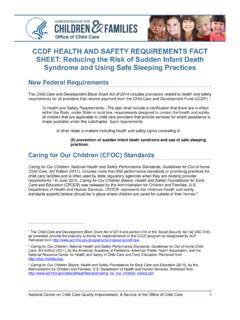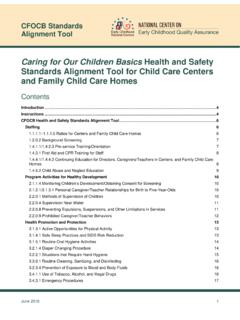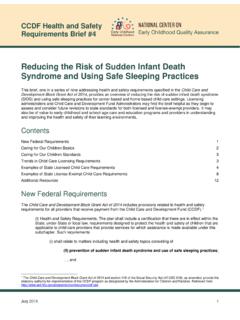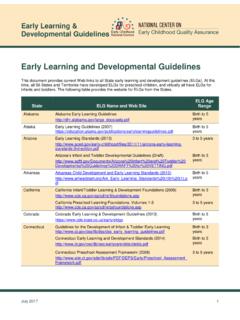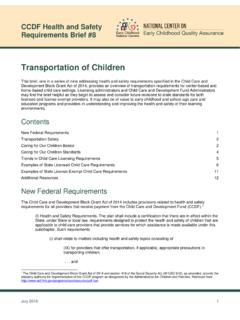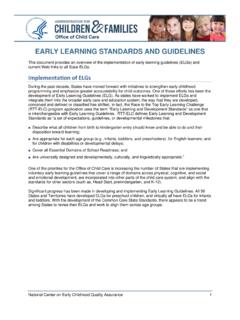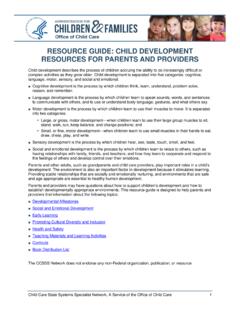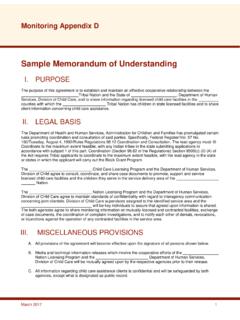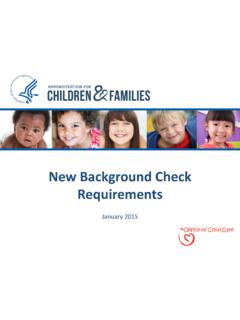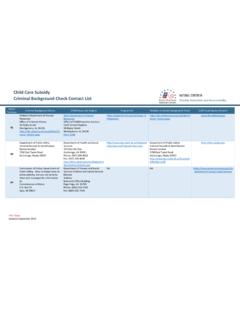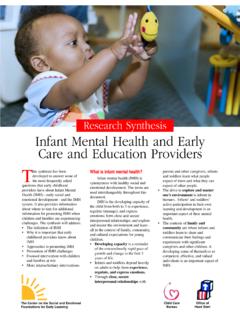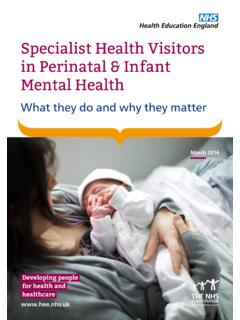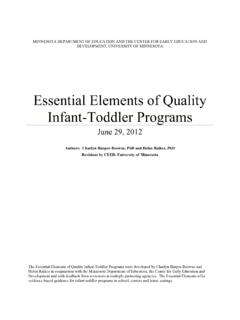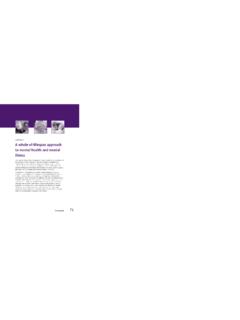Transcription of Infant/Toddler Development, Screening, and Assessment …
1 Infant/Toddler Development, Screening, and AssessmentNational infant & Toddler Child Care Department of health and Human ServicesAdministration for Children and Families 2 This page intentionally left blankInfant/Toddler Development, Screening, and Assessment is one of three Infant/Toddler modules created to support consultants working in child care settings, especially those who have not had education or training specific to infants and toddlers in group care. These modules were designed to complement training offered to early childhood consultants through the National Training Institute at the Department of Maternal and Child health , University of North Carolina at Chapel Hill.
2 The Infant/Toddler modules, which also include Relationships: The Heart of Development and Learning and Infant/Toddler Curriculum and Individualization, provide content on early development and quality child care policies and practices for consultants working in child care settings serving children ages birth to 3 years. As the modules do not focus on developing consultation skills, they are not intended to be used as stand-alone trainings. They should be incorporated into training that also addresses the critical skills and process of consultation. Information about the National Training Institute for Child Care health Consultants can be found at or by contacting the program at the following address:National Training Institute for Child Care health Consultants Department of Maternal and Child health 116-A Merritt Mill Road Campus Box #8126 The University of North Carolina at Chapel Hill Chapel Hill, NC 27599-8126 Phone: 919-966-3780 Email.
3 Module was created through the National infant & Toddler Child Care Initiative @ ZERO TO THREE, a project of the federal Office of Child Care, in response to a request for technical assistance from the Connecticut Head Start State Collaboration Office on behalf of Healthy Child Care New England, a collaborative project of the six New England states. We would like to acknowledge the inspiration and contributions of Grace Whitney, PhD, MPA, director of the CT Head Start Collaboration Office, as well as the contributions of the New England project advisory team, the Region I Administration for Children and Families, Office of Child Care, and the New England Child Care and Development Fund document was prepared under Contract # 233-02-0103 with the Department of health and Human Services.
4 The views expressed in the document are those of the contractor. No official endorsement by the Department of health and Human Services is intended or should be : April, 2010 3 COVER CREDITSC lockwise from top left: Markowski, Memory, Markowski, Santa Maria, Clark, Markowski. 4 TABLE OF CONTENTSL earning Objectives 7 INTRODUCTION 8 Infant/Toddler DEVELPOMENT 8 An Overview of Infant/Toddler Development 8 The Developmental Continuum and Appropriate Expectations 9 Infant/Toddler Development Is Integrated Across Domains 9 How Caregivers Can Nuture Infant/Toddler Development 10 Nature vs. Nurture: It s Not Either/Or, It s Both 10 ACTIVITY I: Comparing health and Safety Standards 14 The Role of the Child Care Consultant 16 Where to Find More Information 16 Engaging Parents In Development, Screening, and Ongoing Assessment 18 Family/Caregiver Collaboration to Support Overall Development 19 Parent/Caregiver Collaboration in Screening and Assessment 19 The Role of the Child Care Consultant 20 Where To Find More Information 20 OBSERVATION, SCREENING, AND ONGOING Assessment 22 Screening and Assessment : Definition and Purpose 23 ACTIVITY II.
5 Comparing Screening Tools 28 Ongoing Assessment Of Infants and Toddlers 29 What Is Ongoing Assessment ? 29 Ongoing Assessment of Infants and Toddlers: What Does It Look Like? 31 ACTIVITY III: Using Existing Practices to Compile Portfolios 32 ACTIVITY IV: Infant/Toddler Assessment Challenges to Programs 33 ACTVITY V: Consulting for Quality in Screening and Assessment 34 The Role of the Child Care Consultant 35 Where To Find More Information 35 RED FLAGS AND REFERRALS 36 What Is a Red Flag? 36 Atypical Development: When Does a Red Flag Become a Concern? 37 Communicating With Parents About Developmental Concerns 37 ACTIVITY VI: Supporting Infant/Toddler Caregiver Communication With Parents What Would You Do?
6 41 Referral 42 ACTIVITY VII: Connecting With Systems Supporting Infant/Toddler Development 46 The Role of the Child Care Consultant 47 Where To Find More Information 47 REFERENCES 50 APPENDICES 52 Appendix A. Developmental Milestones of Children From Birth to Age 3 53 Appendix B. Infant/Toddler Early Care and Education and the Part C Screening/ Assessment Cycle 57 Appendix C. Early Head Start National Resource Center Technical Assistance Paper No. 4 58 Appendix D. NECTAC Screening Instruments 65 5 6 This page intentionally left blankInfant/Toddler Development, Screening and AssessmentLEARNING OBJECTIVESUpon completion of this module, child care consultants will be able to: Describe factors that affect Infant/Toddler development and identify resources for reference on developmental milestones.
7 Discuss how the integrated nature of Infant/Toddler development affects overall growth and development. Describe their state s professional development system supports for infant / toddler caregivers and how they can be accessed. Define the difference between observation, screening, and ongoing Assessment and the key components of each process. Discuss the importance of coordinating referrals with the family and other care providers, such as medical and dental homes, therapists, and additional child care providers. Identify key aspects of the state Part C/Early Intervention system for infants and toddlers with disabilities. Discuss the importance of involving families in the process of observation, screening, and Assessment .
8 7 Infant/Toddler DevelopmentINTRODUCTIONThe purpose of this module is to provide child care consultants with information that will support their work with individuals and child care programs serving infants, toddlers, and their families. The module includes: A brief overview of Infant/Toddler development. Information on how Infant/Toddler caregivers can nurture Infant/Toddler development. Discussion of how programs can involve families1 in recognizing and promoting their child s development. Information on how Infant/Toddler caregivers know how infants and toddlers are developing (observation, screening, and Assessment ). Ideas about what to do when development is not proceeding as THE CHILD CARE CONSULTANT SHOULD KNOW An Overview of Infant/Toddler DevelopmentThe development that occurs from birth to 3 years provides the foundation for subsequent development across domains.
9 Although it is common practice to discuss early development within discrete domains, the number and labeling of these domains is not standardized and varies considerably depending on the field in which the discussion occurs. But discussions of development typically include some combination of the following domains: Physical o Growth and health status o Sensory Motor o Fine motor o Gross motor 81 In this module, family refers to adults who have primary responsibility for parenting a child and/or other family members who may be routinely involved in the child s life. Family can include biological parents, foster parents, adoptive parents, grandparents, legal guardians, and others.
10 Cognitive o Approaches to learning Communication/Language Social/Emotional (including mental health )The Developmental Continuum and Appropriate ExpectationsInfant/toddler development proceeds in a predictable sequence: infants crawl before they walk, babble before they talk, and so on. But when each developmental milestone is achieved varies from child to child. A primary task of child care consultants will be to guide caregivers awareness of Infant/Toddler development and of the age range that may be considered typical for the emergence of key developmental indicators. Awareness of the age range of Infant/Toddler development is important to: Ensure caregiver competence in observing Infant/Toddler development.
